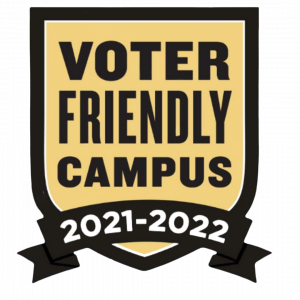GREENEVILLE – Tusculum University takes the privilege of voting seriously and works extensively in the classroom and in groups to encourage students to register to vote and cast a ballot.
Those efforts have earned the university the designation of Voter Friendly Campus. The initiative is led by national nonpartisan organizations Fair Elections Center’s Campus Vote Project and NASPA – Student Affairs Administrators in Higher Education. It held participating institutions accountable for planning and implementing practices that encouraged students to register and vote in 2020 elections and in the coming years.
Tusculum is one of only six colleges and universities in Tennessee to achieve this designation.
“We’re pleased and grateful to be recognized for our commitment to help people embrace the opportunity to participate more fully as a citizen through voting,” said Dr. Jacob Fait, executive director of Tusculum’s Center for Civic Advancement and dean of the College of Business. “Our students, faculty and staff members share the value of voting and are focused on helping people know about the benefits of participating in this process.”
During 2020, Tusculum held registration drives, including during freshmen orientation classes to discuss the importance of voting and help students register if they were interested. In addition, three Tusculum professors made public presentations about the electoral process. Dr. Mary Cooper, an associate professor of political science, also taught a class on the 2020 election, a tradition for her during presidential and mid-term

elections.
Student McKenzie Myers had an internship with the Center for Civic Advancement, and her goals were to increase student voter turnout and student participation on campus. She organized Tent Talks – conversations under a tent – which she discovered through research to be a successful way to increase student interest in politics. The talks were designed to stimulate respectful and open-minded discussion about political topics, especially those considered controversial, she said.
Tusculum Honors Program students also worked on a comprehensive project called “The Informed Citizen,” which consisted of writing about electoral candidates and party platforms, election processes and reasons for voting, as well as giving key dates. This information was posted on a Tusculum web page.
The university’s voting initiatives were enhanced with the development of a Student Voting Committee. Anyone at Tusculum could participate in it.
Encouraging informed and active citizenship is a regular practice at Tusculum. The university has engaged in voter registration drives for several years. In addition, Dr. Cooper conducted research in 2019 with assistance from several students, in which they asked students in the freshmen orientation class for their understanding of the reasons people vote or do not participate in that process.
“I am proud of our students, faculty and staff for vibrantly living our mission statement by promoting the electoral process,” said Dr. Scott Hummel, Tusculum’s president. “We want our students to be civically engaged on campus and as professionals after graduation so they can be informed members of society and help strengthen their communities.”


